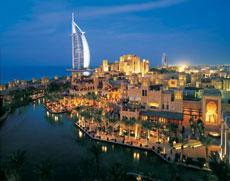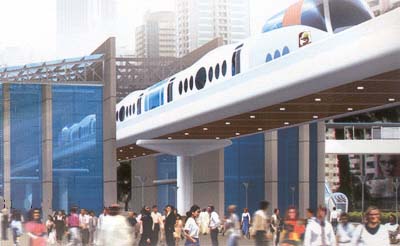|
The skies seem brighter than ever
for Dubai’s hospitality industry as yet another
record-breaking year came to and end. Data from 2004
confirms the emirate’s status as a regional travel hub
with an increase of 42 per cent in hotel establishment
revenues generated in the first nine months of the year.
The volume of business done by Dubai hotels in the three
quarters of 2004 totalled Dhs.4.38 billion. In 2003,
almost five million visitors come to the emirate,
marking a five-per cent increase on 2002.
While the number of visitors to the emirate has risen,
so has the average hotel room rate with many five-star
hotels slashing lower-paying guests segments such as
cabin crew and going after higher-paying customers.
Dubai is now firmly established on the global tourism
map and is currently considered on par with popular
destinations such as Turkey, Egypt and Singapore. With
visitors from over 150 countries arriving in Dubai each
year, it seems the demand is higher than supply when it
comes to hotel accommodation. The city is appealing to a
diverse set of audiences. With 458,451 visitors, the UK
was Dubai’s top market last year, followed by Saudi
Arabia, which generated 457,736 visitors, and Iran with
342,571 visitors. Other important markets are India,
Russia, Oman, Pakistan, Kuwait, Germany, USA, Bahrain
and Egypt.
While January and February are the busiest months for
the tourism industry, with an average occupancy rate of
94 and 95 per cent respectively, there are indications
that Dubai is now becoming an all-year-round
destination. Occupancy levels have remained stable
throughout the year with an average of 82.4 and 72.7 per
cent in the months of June and July, which are usually
the slowest in terms of tourist arrivals. In the third
quarter of 2004, beach properties were way ahead of the
city-centre hotels in terms of occupancy levels, with a
rate of 90 % in August, against 84.2 % during the same
month last year. This is followed by 87.1 % in September
2004 compared with 76.6 % the same period last year.
While Dubai is primarily a leisure destination with 70
per cent of all 2004 visitors being leisure travellers,
the emirate is quickly becoming a popular meetings &
incentives destination. After the IMF and World Bank
meetings in 2003, Dubai is ready to take on any MICE
event of any size.
Further, Dubai Convention Bureau has been created in
2001 specifically with the task of promoting Dubai as a
business tourism destination. The Bureau has set a
target of attracting an additional 600,000 guest nights
from the international rotating meeting market by 2008,
generating cumulative revenues for Dubai’s hotels in
excess of US$ 200 million.

Some of the big international events to be hosted in
Dubai soon include the 40th World Congress of
the International Advertising Association in March 2006.
The city has been chosen unanimously over competitors
such as Miami and Sydney. Another big event is coming up
in 2008 when Dubai will host the World Association of
Cooks Societies World Congress which will gather under
one roof over 2,500 chefs, hoteliers and restaurateurs.
With so many opportunities opening up, it is little
wonder that tourism has become a major earner for Dubai.
Dubai posted the world’s highest growth of 31 per cent
in international tourism arrivals in 2002 and this meant
hotel establishments generated a total of Dhs.3.8
billion as revenue. Tourism’s direct contribution to the
economy stood at 17.2 per cent of GDP, while indirectly
it contributed 28.9 per cent. It has been estimated that
by 2010 tourism will be directly responsible for 21 per
cent of GDP. Impressive as these figures are, they
become even more so when the fact that Dubai’s tourism
industry is only about 20 years old is taken into
consideration. The emirate’s tourism success story has
even been features in a textbook published by the Press
Syndicate of the University of Cambridge and forms part
of the Cambridge International Examination syllabus.
Its pristine beaches and the year-round sunshine are
Dubai’s major selling points. Dubai is also famed as a
shoppers’ paradise with a variety of options to satisfy
different tastes and budgets – from lively souks where
bargains are the order of the day to stylish luxury
goods boutiques.
A truly cosmopolitan city, Dubai has still remained
faithful to the spirit of Arabia and it is this peaceful
coexistence of old and new that is a massive
crowd-puller. Whether it is relaxation or fun that
visitors are looking for, the city offers a safe
atmosphere. In fact, for the second year in a row, the
city has been voted as the safest destination in the
world by the influential Conde Nast Traveller magazine.

However, there are many cities in the world offering
pretty views, sunshine ad great shopping and yet, they
have not managed to attract the large number of visitors
Dubai has. According to Eyad Ali Abdul Rahman, Media
Relations Manager at the Department of Tourism and
Commerce Marketing, Dubai’s astounding success is the
result of several factors, including its strategic
geographical location, on the crossroads of Europe, Asia
and Africa, its excellent infrastructure and proactive
economic policies.
When it comes to hotel infrastructure, visitors are
spoiled for choice in Dubai. All major global hotel
chains own or operate properties in the city. With some
372 hotels and hotel apartments with an inventory of
25,000 rooms, Dubai enjoys the highest concentration of
hotels compared with its population. It is not merely
the large number of hotels, but rather the high-quality
service and standards they provide that is responsible
for the tourism boom.
Dubai is home to some of the world’s most exciting
hotels such as the Burj Al Arab, which has attracted an
enormous amount of international media attention an
currently enjoys an iconic status. And the list does not
end here. Coming up in 2006 is the world’s first
underwater hotel, worth US$500 million. Situated off the
Jumeirah coast, Hydropolis will have 220 rooms and will
boast unparallel underwater views. Another exciting
project is Dubailand, a Dhs.18 billion theme park, which
is said to become the Middle East’s answer to Disneyland
in Florida. The park will include an artificial rain
forest under an enormous glass dome and a ski slope with
artificial snow.
Dubai is also home to the exciting Palm Island and World
projects, which have attracted a great degree of
interest from international investors and hotel
developers, while also substantially increasing the
emirate’s coastline. Other projects which will boost the
city’s tourist appeal include the Burj Dubai, the
world’s tallest tower and the Dhs.1.8 billion Dubai
Healthcare City which will help turn Dubai into a
regional medical hub.
The success of Emirates Airline, which is one of the
fastest-growing airlines in the world, as well as Dubai
International Airport’s emergence as a key aviation hub
are two factors that also augur well for the emirate’s
hospitality industry. Over 18 million passengers passed
through Dubai International Airport in 2003, an increase
of 13 per cent on 20002. As may as 105 airlines serving
145 destinations currently fly out of Dubai
International Airport, which is currently undergoing
reconstruction and enlargement works worth Dhs.4.1
billion.

Apart from world-class infrastructure, Dubai’s success
as a tourism destination is due to the collaboration
between the private sector and the government, which was
the architect of the current tourism boom. Dubai’s
government first identified tourism as a potential money
earner in the late 1980s. A dedicated tourism and
promotion board was set up in 1993. In 1997, the DTCM
took over and has since been responsible for the
licensing of hotels, hotel apartments, tour operators
and tour guides in the emirate and managing key heritage
sites as well as for supporting all tourism players in
the market and promoting Dubai overseas.
Some 350 people work for the DTCM in Dubai. The
department holds regular meetings with various hotel
industry players and ensures issues faced by individual
hotels or by the industry as a whole are put forward to
the relevant government departments and dealt with
quickly. The cooperation between the public and the
private sectors has a lot to do with the outstanding
success of Dubai as a destination.
The DTCM is also responsible for making sure all hotels
maintain high standards that will make coming to Dubai a
pleasurable experience for tourists. In 2001, the
Department also developed an online system for
complaints and, two years later, started providing a
round-the-clock complaint service through its visitors’
information bureau at the Dubai International Airport.
Promoting Dubai around the world is just as important to
the emirate’s tourism success. The DTCM has 14 overseas
offices, covering key markets such as the US, the UK,
France, Germany, the Nordic countries, Switzerland,
Austria, Italy, the Russian Federation, CIS and Baltic
states, South Africa, Saudi Arabia, India, the Far East,
Japan and Australia and New Zealand. Overseas
departments are responsible for advertising, media
campaigns and other public relations initiatives. A
total of 181 journalists from all over the world visited
the UAE from January until 22 October this year, while
Dubai is being promoted at more than 30 major
international travel trade events. The DTCM’s plans are
equally ambitious for 2005, when Dubai will be looking
to break yet another tourism industry record. |
